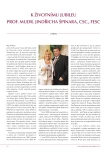-
Medical journals
- Career
Hypertension treatment in patients with metabolic syndrome
Authors: M. Souček; I. Řiháček; P. Fráňa; M. Plachý
Authors‘ workplace: II. interní klinika LF MU a FN U sv. Anny v Brně
Published in: Kardiol Rev Int Med 2010, 12(2): 73-76
Overview
The issue of hypertension treatment in patients with MS should be approached as topical, considering the high prevalence of these patients in the population and frequent target organ damage. Non-pharmacological management should be preferred in these patients with pharmacological treatment applied always when the blood pressure levels are 140/90 mmHg and higher. Renin-angiotensin axis blockers (ACE-I, sartans) are the first line choice. When the treatment is insufficient, these agents should be combined with calcium channel blockers, centrally acting agents or, alternatively, a low dose thiazide diuretic or indapamide. The HYVET study provided an evidence on hypertension treatment in advanced age patients.
Keywords:
metabolic syndrome – hypertension – combination therapy
Sources
1. Muntner P, He J, Chen J et al. Prevalence of non-traditional cardiovascular disease risk factors among persons with imapaired fasting glucose, impaired glucose tolerance, diabetes, and the metabolic syndrome: analysis of the Third National Health and Nutrition Examination Survey (NHANES III). Ann Epidemiol 2004; 14 : 686–695.
2. Kereiakes DJ, Willerson JT. Metabolic syndrome epidemic. Circulation 2003; 108 : 1552–1553.
3. Cífková R, Škodová Z, Lánská V et al. Trends in blood pressure levels, prevalence, awareness treatment, and control of hypertension in the Czech population from 1985 to 2000/2001. J Hypertens 2004; 22 : 1479–1485.
4. Mancia G, Parati G, Borghi C et al. SMOOTH investigators. Hypertension prevalence, awareness, control and association with metabolic abnormalities in the San Marino population: the SMOOTH study. J Hypertens 2006; 24 : 837–843.
5. Executive Summary of The Third Report of The National Cholesterol Education Program (NCEP) Expert Panel on Detection, Evaluation and treatment of High Blood Cholesterol in Adults (Adult Treatment Panel III ). JAMA 2001; 285 : 2486–2497.
6. 2007 Guidelines for the Management of Arterial Hypertension. J Hypertens 2007; 25 : 1105–1187.
7. Tuomilehto J, Lindström J, Eriksson JG et al. Finnish Diabetes Prevention Study Group. Prevention of type 2 diabetes mellitus by changes in lifestyle among subjects with impaired glucose tolerance. N Engl J Med 2001; 344 : 1343–1350.
8. Cífková R. Hypertenze a metabolický syndrom. In: Widimský J a kol. Hypertenze. 3. rozšířené a přepracované vyd. Praha: Triton 2008, 532-548.
9. Widimský J jr, Cífková R, Špinar J et al. Doporučení diagnostických a léčebných postupů u arteriální hypertenze – verze 2007. Doporučení České společnosti pro hypertenzi. Vnitř Lék 2008; 54 : 101–118.
10. Conroy RM, Pyörälä K, Fitzgerald AP et al. SCORE project group. Estimation of ten-risk of fatal cardiovascular disease in Europe: the SCORE Project. Eur Heart J 2003; 24 : 987–1003.
11. Mancia G, Laurent S, Agabiti-Rosei E et al. Reappraisal of European guidelines on hypertension management: a European Society of Hypertension Task Force document. J Hypertens 2009; 27 : 2121–2153.
12. Hansson L, Lindholm LH, Niskanen L et al. Effect of angiotensin-converting enzyme inhibition compared with conventional therapy on cardiovascular morbidity and mortality in hypertension: Captopril Prevention Project (CAPP) randomised trial. Lancet 1999; 353 : 611–616.
13. Dahlöf B, Lindholm LH, Hansson L et al. Morbidity and mortality in the Swedish Trial in Old Patients with Hypertension (STOP-Hypertension). Lancet 1991; 338 : 1281–1285.
14. UK rospective Diabetes Study Group. Tight blood pressurte control and risk of macrovascular and microvascular complication in Type 2 diabetes: UKPDS 38. BMJ 1998; 317 : 703–713.
15. Yusuf S, Sleight P, Pogue J et al. The Heart Outcomes Prevention Evaluation (HOPE) Study Investigators.Effects of an angiotensin-converting-enzyme inhibotor Ramipril on cardiovascular events in high risk patients. N Engl J Med 2000; 342 : 145–153.
16. Nadar S, Lim HS, Beevers DG et al. Lipid lowering in hypertension and heart protection: observation from the Anglo-Scandinavian Cardiac Outcomes Trial (ASCOT) and the Heart Protection Study. J Hum Hypertens 2002; 16 : 815–817.
17. Jamerson KA, on behalf of the ACCOPLISH investigators. Avoiding cardiovascular events in combination therapy in patients living with systolic hypertension. American College of Cardiology Scientific Sessions; March 31, 2008; Chicago, IL.
18. Patel A and ADVANCE Collaborating Group. Effects of a fixed combination of perindopril and indapamide on macrovascular and microvascular outcomes in patients type 2 diabetes mellitus (the ADVANCE trial): a randomized controlled trial. Lancet 2007; 370 : 829–840.
19. Fox KM. EURopean trial On reduction of cardiac events with Perindopril in stable coronary Artery disease Investigators. Efficacy of perindopril in reduction of cardiovascular events among patients with stable coronary artery disease: randomised, double-blind, placebo controlled, multicentre trial (the EUROPA study). Lancet 2003; 362 : 782–788.
20. Beckett NS, Peters R, Fletcher AE et al for the HYVET Study Group. Treatment of hypertension in patients 80 years of age or older. N Engl J Med 2008; 358 : 1887–1898.
21. Nevrlka J, Souček M. Metabolický syndrom a hypertenze. Remedia 2006; 16 : 146–151.
Labels
Paediatric cardiology Internal medicine Cardiac surgery Cardiology
Article was published inCardiology Review

2010 Issue 2-
All articles in this issue
- Hypertension treatment in patients with metabolic syndrome
- Primary hyperaldosteronism: the most common form of secondary hypertension
- Do we have sufficient evidence for cardiac resynchronization therapy indication in patients with cardiac failure and NYHA functional classification I-II?
- Catheter closure of PFO and paradoxical systemic embolisation
- Transcranial colour-coded duplex sonography to evaluate intracranial arteries in patients with cerebrovascular stenooclusive disease – review
- Cardiology Review
- Journal archive
- Current issue
- Online only
- About the journal
Most read in this issue- Catheter closure of PFO and paradoxical systemic embolisation
- Transcranial colour-coded duplex sonography to evaluate intracranial arteries in patients with cerebrovascular stenooclusive disease – review
- Primary hyperaldosteronism: the most common form of secondary hypertension
- Hypertension treatment in patients with metabolic syndrome
Login#ADS_BOTTOM_SCRIPTS#Forgotten passwordEnter the email address that you registered with. We will send you instructions on how to set a new password.
- Career

